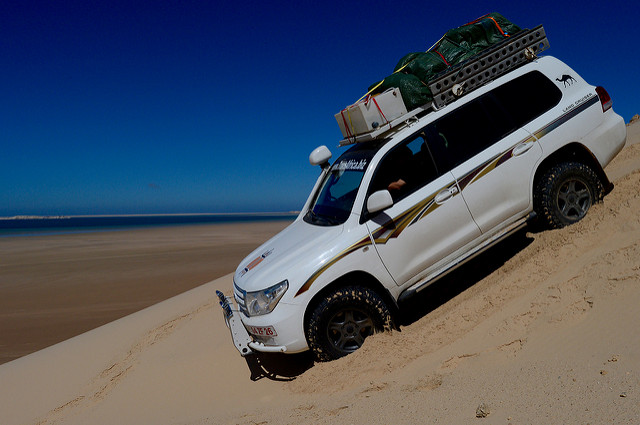Information
COMFORT is a must in order to fully enjoy the travel experience.
• Modern and comfortable air-conditioned 4x4 vehicles will be the main means of transportation.
• We will spend most of the overnights in hotels and fixed camps with large tents, beds, facilities and restaurants (25 nights out of 29). The hotels have been chosen according to the criteria of comfort, typical architectural style, restaurant quality, friendly service and scenic locations.
• 4 nights will be spent at a mobile camp. Our modern tents are provided with mattresses and are totally equipped with mosquito nets at the windows. Tents are placed on a large mat that further isolates them from the soil. The staff will install the camp with the cooperation of the participants. Warm dinner will be prepared by the cook and served at tables.
Camping in tents, under the stars is a must of the “Sahara experience”.
SAFETY is the main condition to our operation.
The tour is based on a long experience in the area and is led by the best experts. The itinerary is constantly monitored from our local connections that will have direct information from the field.
CLIMATE (spring and late Autumn)
Late autumn and spring are the best seasons in the Sahara; climate is mild and pleasant - nights are cool but not cold and days are warm but not too hot.
Black Africa, south of Sahara: climate is mild and warm, some days might be hot.
Tour program:
-
Dakar SENEGAL Day 1
Arrival in Dakar - Senegal capital
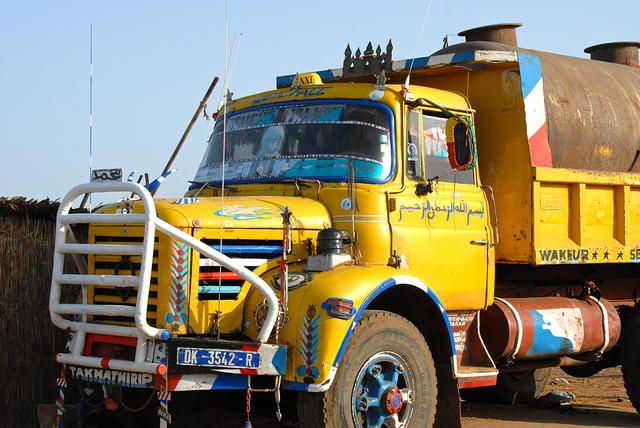
Arrival to Dakar, join the group
-
GOREE SENEGAL Day 2
GOREE, THE SLAVE ISLAND
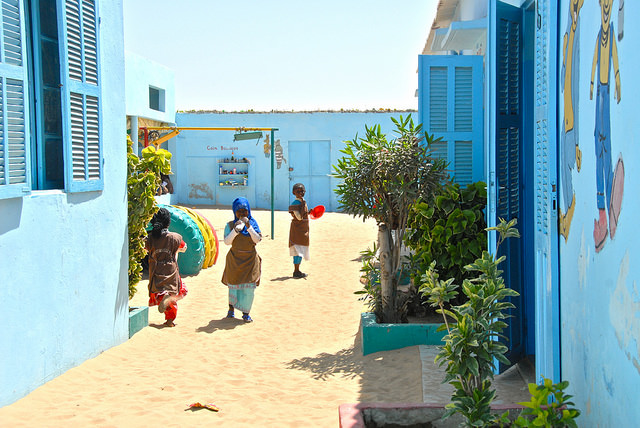
Lunch in a restaurant specialized in the “catch of the day” other menus available. Dakar became an important centre of political, artistic and intellectual “renouveau” during the independence of the country, and is still today a lively African metropolis. Visit of the town centre and a traditional market. We will board on a ferry to Gorée Island, facing Dakar. Gorée is where the slaves used to be crammed, waiting to be shipped to the Americas. Totally restored buildings remain to bear witness of those times, however thanks to the nice breeze, the many restaurants and shops, Gorée today has become a very pleasant and trendy location for local and foreign visitors. The right time to enjoy Gorée is at sunset when all tourist are gone- Dinner in the plaza facing the small harbour and overnight at “Maison Municipal” or similar.
A comfortable Guest house in an ancient, restored building.
-
DAKAR SENEGAL Day 3
DAKAR, CONTEMPORARY ARTISTS
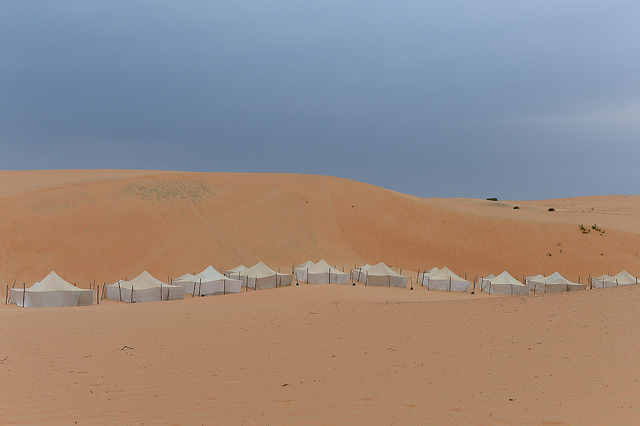
“Village des Arts” is composed by more of fifty workshops of contemporary artists. The Senegalese artistic scene has attracted artist from al the continent. We will meet the artist in their production site and discover their works that range from painting and sculpture and pottery to photography and filming ….
Lac Rose or Lac Retba (meaning Pink Lake), is a saltwater lake surrounded by dunes. The water is ten times saltier than the ocean and due to the high concentration of minerals, the lake often shimmers into pink; swimming in the lake gives the sensation of floating. More than 600 people work there collecting salt from the lake in the traditional way.
Afternoon arrival to Lampoul desert, we cross some ranges of dunes to reach our comfortable fix camp. Dinner and night at Lampoul Eco Lodge.
Tents are spacious, with beds and private facilities.
-
Saint Louis SENEGAL Day 4
Saint Louis
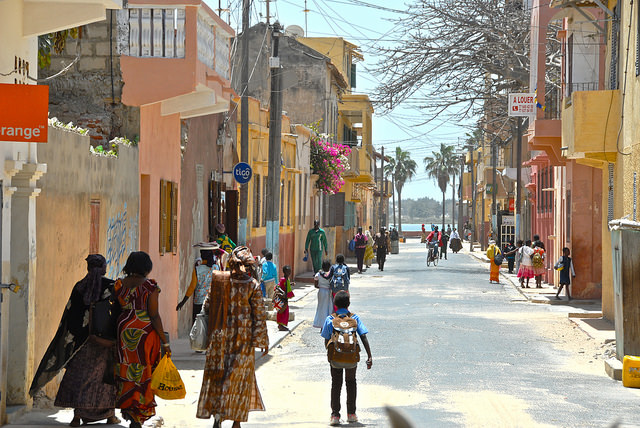
Drive to Saint Louis. Lunch in a typical restaurant.
Dinner and overnight at “Hotel de la Poste”, a historical hotel built in 1850 and which used to be the base of the “Aeropostale” (airmail pioneer operation) pilots. Totally restored, it has conserved the best “old colonial atmosphere” in town.
Visit of Saint Louis, a charming old town which was the first capital of the French colonies in West Africa.
The old town is built on two long islands of Senegal River between river and ocean and has a breezy climate. The first island has been the administrative colonial capital of the French West Africa until 1902, when the administration was transferred to Dakar. The second island, near the ocean, is inhabited by a large local community of fishermen.
The best way to get around the narrow streets of Saint Louis is on a buggy pulled by the horse, like the locals do!
We will spend the night at the Hotel de la Poste **** It was the hotel where the Aeropostale pilots use to stay, historical building it has been fully restored.
-
Djoudj Park SENEGAL Day 5
Djoudj Ornitological Sanctuary
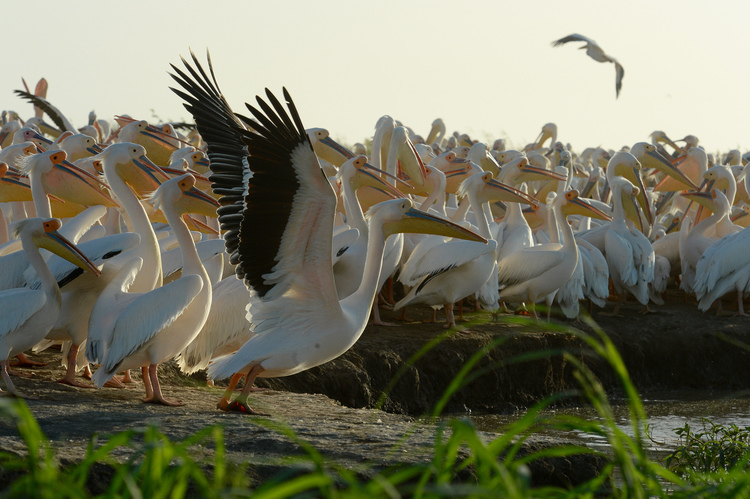
Early morning departure to Djoudj National Park, a natural oasis composed by hundreds of miles of partially flooded lands. This “humid paradise” is the best habitat and nesting site of over a million migratory and sedentary birds. Wikipedia says: “The Djoudj National Bird Sanctuary lies on the southeast bank of the Senegal River in Senegal, in northern Biffeche, north east of St-Louis. It provides a range of wetland habitats which prove very popular with migrating birds, many of which have just crossed the Sahara. Of almost 400 species of birds, the most visible are pelicans and flamingos. Less conspicuous are the aquatic warblers migrating here from Europe; for these, the park is the single most important wintering site yet discovered. A wide range of wildlife also inhabits the park, which is designated a World Heritage Site.
Boat excursion to visit the banks of an island in which there is an astonishing concentration of pelicans.
Continue to the Mauritanian border. The landscape will change slowly from a dry savannah to the desert with ranges of dunes. Evening arrival in Nouakchott, the capital of Mauritania, a new town surrounded by the desert.
Dinner and overnight at comfortable hotel Halima.
-
Chinguetti SENEGAL Day 6
North to the Sahara
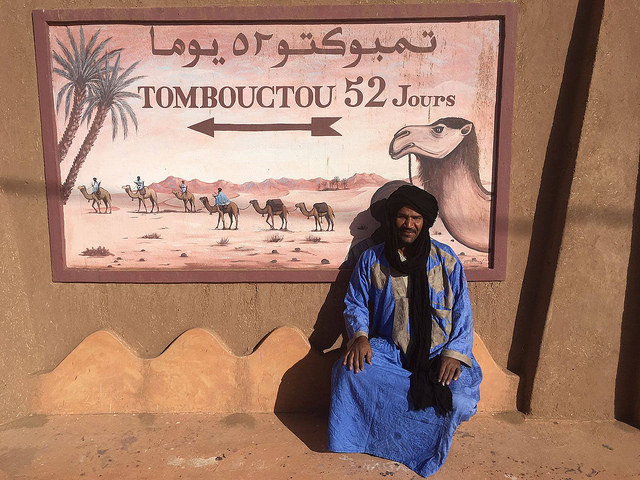
Day driving long on the road going north in the desert. Crossing the Adrar Mountains through scenic landscapes with gorges and highlands to the oasis of Chinguetti. In the afternoon we will arrive at the guest houses where we will spend three nights.
Dinner and overnight at “La Gueila” Guest House (or private residence), the cosiest addresses in Chinguetti. Comfortable rooms in a traditional buildings. Mauritanian cuisine with a French touch.
-
Ouadane MAURITANIA Day 7
Ouadane, the Remotest
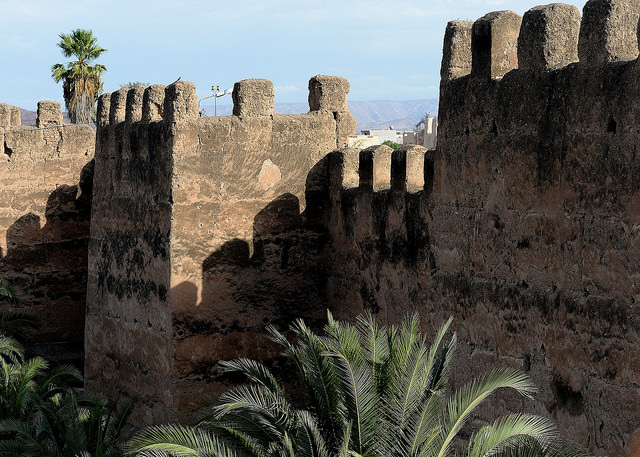
Entire day dedicated to discover Ouadane, the remotest oasis in Mauritania, an outpost in the emptiest of the desert. Ouadane was founded in 1147. Mainly in ruin, some of his stone houses perched on a rocky hill surrounded by the immensity of Sahara are still inhabited. In the ancient days this town was an important caravan trading point between Maghreb and black Africa.
Trading was so flourishing that in 1487 Portuguese built a fortified trading counter in the region.
We will return to Chinguetti in an absolute “out of any track” itinerary that follows the Ouadi (dry creek) discovering remote tiny oasis hidden in the high dunes. Arrival to our cosy base in Chinguetti.
Dinner and overnight at “La Gueila” (or private residence)
-
Chinguetti MAURITANIA Day 8
Chinguetti: The Oasis
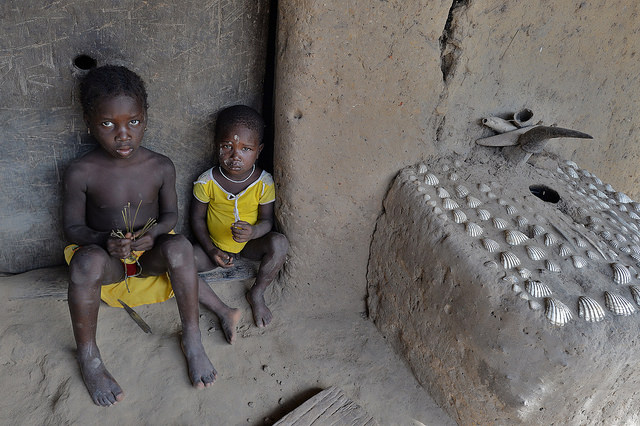
Full day dedicated to discover Chinguetti, the stone village, and the green oasis in a spectacular desert environment. Chinguetti is an ancient Berber town founded in the 8th century as the centre of several trans-Saharan trade routes. For centuries the city was a principal religious place. Part of the old stone town is inhabited. Its ancient mosque built in stone, is considered the second oldest mosque still in use. The Ksar, made of white stone with 5 towers, is a remarkable example of the Arab-Berber architecture. Chinguetti also boasts great collections of ancient manuscripts.
We will spend the evening enjoying the magical atmosphere of this oasis which is considered as being the best preserved in Mauritania and one of the nicest in all Sahara.
Dinner and overnight “La Gueila” (or private residence).
-
Moorish MAURITANIA Day 9, 10, 11
SAHARA EXPLORATION: DUNES and MOUNTAINS
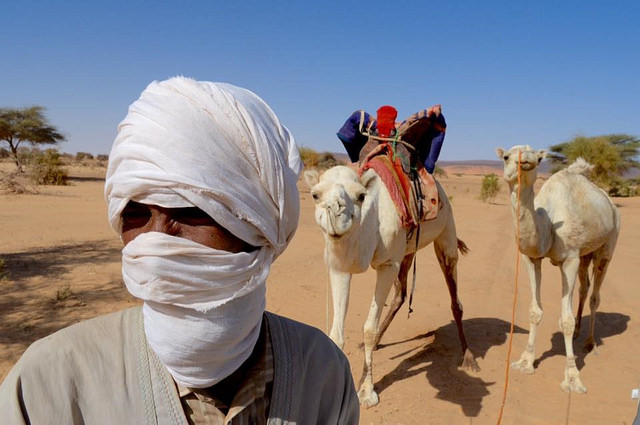
Out of any track, we will discover remote oasis and Moorish nomad tent settlements and the most scenic landscapes of Mauritania: valleys, high mountains, golden yellow sand dunes with ranges of massifs brown and red peaks, and lost adobe villages lit only by the moon in the night. Thanks to the experience of our staff we will follow our own itinerary out of any track, finding our way in the ocean of sand to Inchiri region, one of the less-known areas of the Mauritanian desert. Final arrival to the road and to Nouadhibou
Days 15 and 16 camp on the virgin sands.
Day 17 Nouadhibou, comfortable El Medina hotel ****.
-
MOROCCO MAURITANIA Day 12
Tropic of Cancer
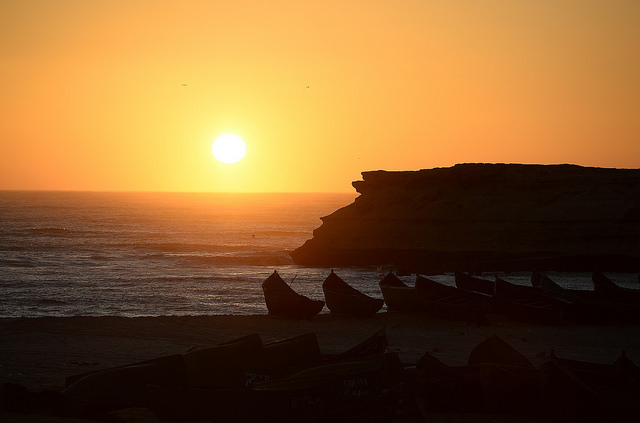
Drive north. At Guerguerat military post we will cross the southern border of Morocco, the only open frontier between Morocco and Mauritania. The region is part of the former Spanish Sahara territory, being this empty desert the site of a long war between the Polisario Armed Front and the Moroccan army. Presently, it is part of Morocco. After the formalities, we will cross a few miles of “no-man land”. The border is a theoretical line in the desert that “divides nothing from nothing”. On the other side, the military post of Morocco, a real sensible place, the only open pass between Maghreb and Sub-Sahara Africa.
A signboard in the desert will indicate that we are crossing the “Tropic of Cancer” line. The road runs along a spectacular cliff that separates the dunes from the waves…
In this rocky universe a few brave fishermen live for months in caves overhanging the sea, extending their fishing rods…
Arrival at the hotel in Dakhla that will be our “base” for two nights.
Hotel Dums, air-conditioned rooms.
-
WESTERN SAHARA Day 13
Dakhla, Rio de Oro
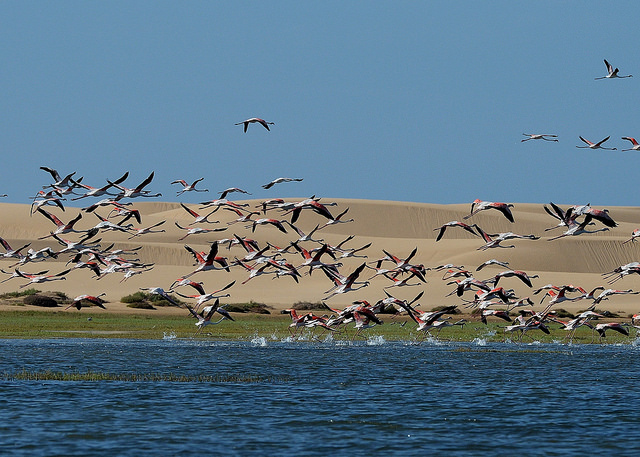
The Rio de Oro (River of Gold) is a 25-mile long sea loch situated between cliffs and dunes. Different colours paint the scenery: the intense blue of the ocean, banks of white sand, green seaweed fields and yellow dunes. The exceptional beauty of this landscape makes of Dakhla peninsula a special place. This small town was founded by Spanish navigators in 1502 and called “Villa Cisneros” until recent times.
Excursion to the colourful fishing harbour and along the shore. Ocean waves lapping the sand dunes and transforming a rocky hill in temporary islands. Lunch in an oyster farm, fish and oysters directly from the sea (vegetarian meals available on request).
Return to the hotel. Dinner in a typical restaurant, and excursion to the animated night street market.
-
MOROCCO Day 14, 15
SAHARA: THE FORBIDDEN TRACK
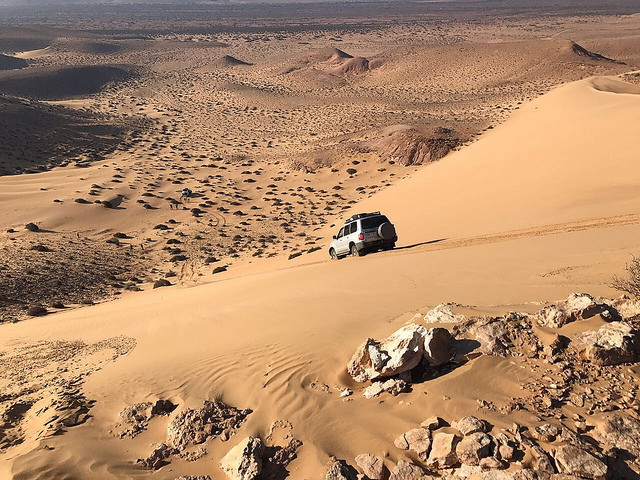
We will meet our local guide, a nomad from a Sahrawi tribe who will lead us during three days through a real desert crossing in the Western Sahara, now Sahara Provence of Morocco.
Since the second half of the seventies, due to the long “sand war,” this region has been off-limits to travellers. Until today no peace treaty has been signed, but a cease-fire is respected. We are proud to be the “first” to take intrepid travellers to discover the vast desert regions of Tiris and Zemmour. During these days of extreme Saharan expedition, we will cross large dunes and get off the tracks to discover wells frequented by long caravans of camels belonging to the legendary Reguibat nomads. Days 13 and 14, camping on the virgin sand of the Sahara.
-
MOROCCO Day 16
FROM THE DESERT TO THE OCEAN
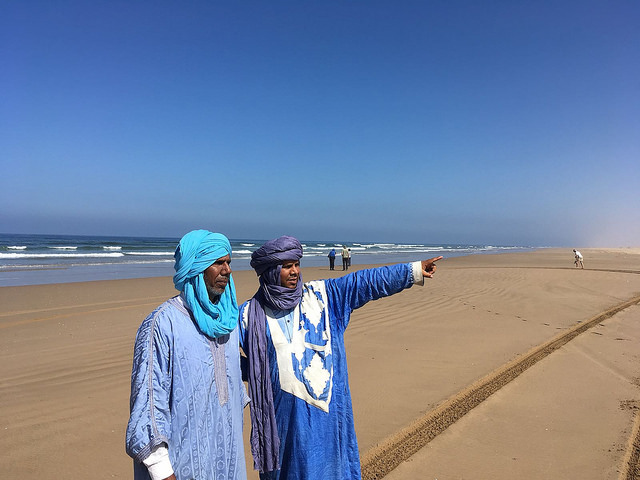
After crossing the automated conveyor belt, the longest in the word, taking phosphate to the Atlantic coast (phosphate is the main resource of the region) we will arrive to Laayoune, a “frontier” town, main base of Morocco economic development in the Sahara. We will arrive in the late afternoon at Tarfaya on the Juby Cape, (facing the Canary Islands that are at less than 100 km). Tarfaya is a former “Aeropostale” base, which pioneered airmail transport from Europe to Africa and Latin America; interesting museum on the Aeropostale and Saint Exupéry, the writer-pilot.
Hotel Casamar, rooms with private facilities. -
MOROCCO Day 17
DUNES AND LAGOONS
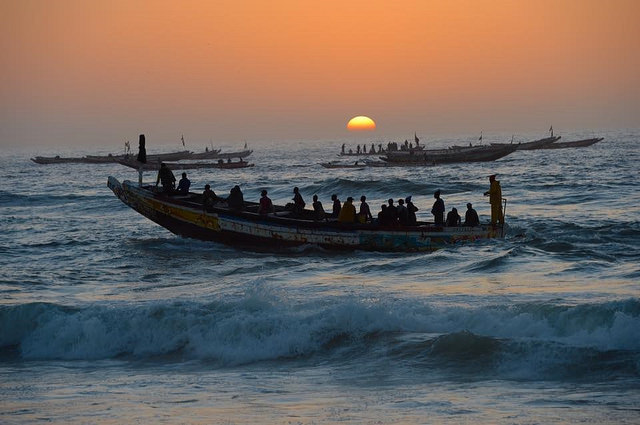
The Naila lagoon is a unique inland sea, separated from the ocean only by rows of dunes; we will rent a local fishing boat to explore the remote shores inhabited only by birds. After lunch in a local restaurant, we will visit a ghost military fort, which still “guards” the former borders between the French protectorate of Morocco and the Spanish Sahara. We will feel like we were on the set of an old Foreign Legion movie.
Evening arrival at the comfortable Ksar Tifnidit hotel, built using local materials in a beautiful Saharan style. The hotel is managed by our friends, Guy and Magali, a French couple. Magali is a desert expert; she won the “Rally des Gazelle,” the most gruelling off-track competition reserved for female teams. Ksar Tifnidit is a meeting point for passionate Sahara travellers.
-
MOROCCO Day 18
ESTUARIES and FISHERMEN
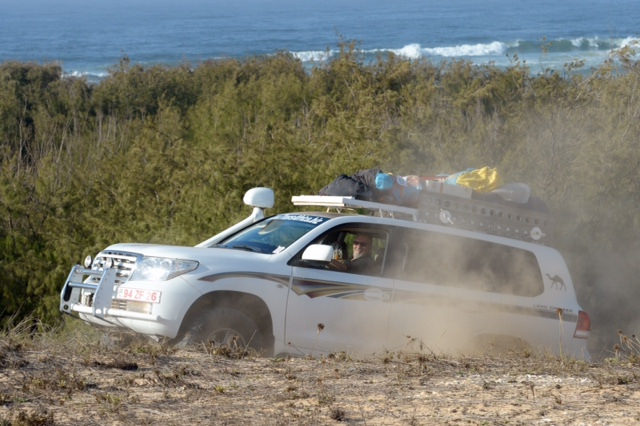
We will leave Tifnidit in the early morning, crossing a steep range of dunes. …
The Dra estuary region is visited only by brave travellers. Between the cliffs and the Atlantic Ocean there are not paved roads. We will discover tiny temporary settlements of fishermen, ghost colonial military posts, dunes, and camels… A steep descent will take us to the bed of a river, the only access to the ocean for an exciting drive on the white beach.
Guelmim has always been an important caravan terminal, and in the Souk we will be still able to find remains of the caravan trade. Dinner and overnight in a comfortable hotel in rooms with air-conditioned.
-
MOROCCO Day 19
OASIS AND CASBAH
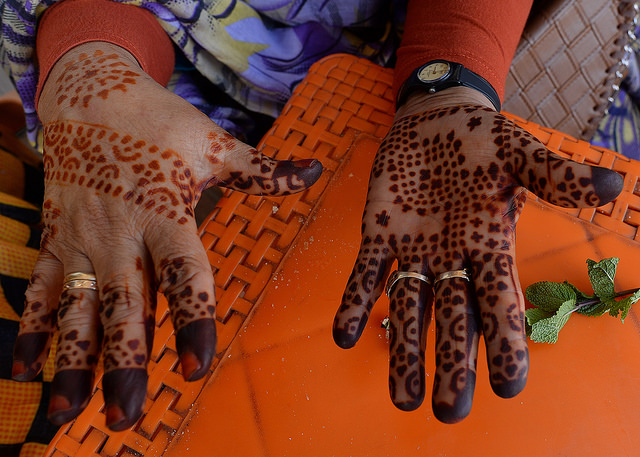
Full day of driving in an astonishing landscape, we will discover luxuriant oasis surrounded by thousands of palm trees and shady gardens, a real miracle in the desert. Near the oasis, there are fortified adobe villages, called Kasbah, still partially inhabited. This scenery will give us a “timeless” feeling as if we were in the Middle Age. Visit of an oasis still shearing irrigation time with an ancient “water hourglass”
Overnight in Foum Zguid at comfortable Bab Rimal Hotel ****.
-
MOROCCO Day 20
DUNES and FOSSILS
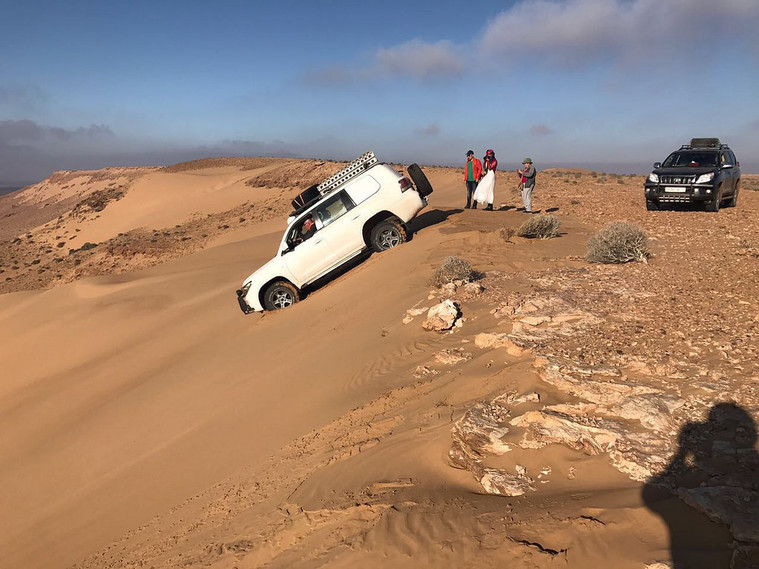
We will leave the main road for an of road itinerary to cross the spectacular landscape of the Iriki Salt Lake through a flat, dry, salty plane. Out of any track, we will discover rocky hills where just looking attentively we will find our own fossils. The tall dune ranges of Erg Chegaga will bar our way, only the expertise of our driver and the experience of our guide will lead us through these sand labyrinths in an unforgettable itinerary, finding our way across steep dunes in the northern edge of the Sahara, the wildest desert on earth.
Evening arrival to a comfortable fix camp in the dunes. Overnight in large tents with beds. Restaurant and facilities.
-
MOROCCO Day 21, 22
ROC ART,CAVERN DWELLERS AND A SECRET VALLEY
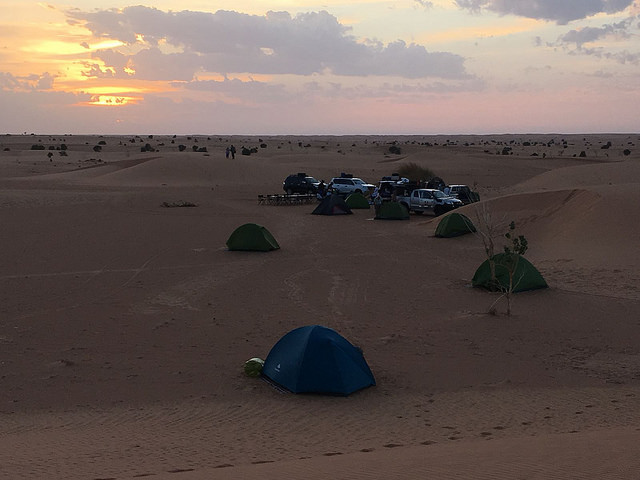
Morning departure following the spectacular road that crosses the Dra Valley.
Visit of an ancient rock art site. Hundreds of fine graffiti dating thousands years ago, silent witnes of peoples living in these regions before the desertification.
We will leave the main road to explore the less visited regions of the Djebel Sarhro mountain range. Following a tiny track that climb rocky valleys through a breath-taking landscape of mountains and desert. A highland itinerary (more than 2,000 meters high) will take us to some Berber villages. We will discover large caves where shepherd families still live permanently, the last remainder of an ancient troglodyte civilization.
Day 20: Overnight at a hotel in Agdz region, comfortable rooms.
Day 21: Overnight in a Ibis hotel in Ouarzazate.
-
MARRAKECH MOROCCO Day 23
MARRAKECH
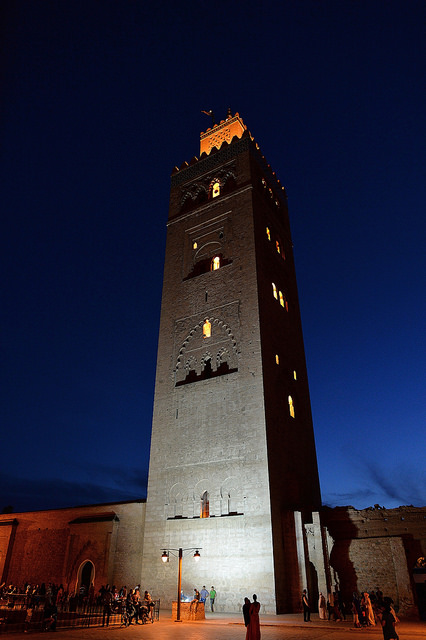
Morning departure, heading north to cross the spectacular High Atlas range on a panoramic route that will take us through the Tin Tichka pass (2,260 m). Meet local gems diggers in quest of Amethyst, Tourmaline…. With their help we will be able to find our own gems. Arrival in Marrakech in the early evening. Marrakech, traditional caravan terminal is the ideal end of our journey.
Day-rooms will be available in a hotel for a last shower before the final transfer to the airport.EXTENSIONS on request
After the expedition, you can stay in Marrakech or visit the rest of Morocco; there are different possibilities.
• TRADITIONAL CULTURES: sacred forests, animistic traditional religions, fetishes and shrines in remote villages, tribal kings, dancing masks … From Moorish nomads and camel herders to fishermen at the edge between desert and Ocean. Legendary Reguibat and Sahrawi nomads of the untamed Western Sahara, currently annexed to Morocco, the most isolated Berber villages and the last cave-dwelling families
• HISTORY: We will visit Gorée - the slave-trade island, Saint Louis – the first capital of the former French West African Colonies. Marrakech – the traditional terminus of the caravans coming from Black Africa through the Sahara will be the perfect ending point for our modern caravan
• NATURE: we will follow the “flyway” in the time of bird migration
Countries
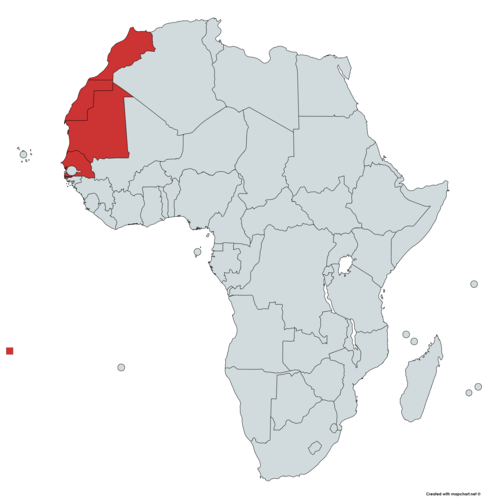
SENEGAL, MAURITANIA, WESTERN SAHARA, MOROCCO
Program cost per person in 1/2 dbl accomodation - double room
The price includes as per indication above, FB from breakfast on day 2 to breakfast on the last day.
Group of 9 or more participants: public price € 5,593
Group of 6 to 8 participants: public price € 5,888
Surcharge for single occupancy
Single supplement 727 Euro
Included
• Assistance at Dakar airport upon arrival and Bissau airport upon departure
• Transfers and tour in a great variety of 8 different transports, each fitting the different geographical environment, allowing maximum interaction with the local peoples, comfort and fun: minibuses/microbuses, 4WD vehicles, local calash (private use), local bush taxi called “taxi brousse” (private use), donkey chariot, local motor boat (private use), speedboat fitted for ocean crossing to the Bijagos Archipelago.
• Tour Leader (languages spoken: English, French, Italian and Spanish)
• Tours and visits as per the programme
• Accommodation in standard rooms/bungalows/permanent tents as per itinerary
• All meals as described, from breakfast of day 2 to lunch of day 14.
• Mineral water in the bus/car/boat during the visits, up to 1 bottle a day.
• Entrance fees to parks, concessions, protected areas and cultural sites, festival and events as in the program.
• Pass for carnival when applicable
• First Aid box
• All service charges and taxes
Not included
• International flights to Dakar and from Bissau
• Visa fees
• Mineral water and drinks at restaurants and hotels.
• Portage
• Fees for personal photos and videos
• Personal insurance (compulsory).
• Tips for drivers, guides and hotel staff
• Any item of personal nature such as phone calls, laundry, etc.
• Whatever is not mentioned as included
Information
Expedition Leader:
With long experience of the visited regions, assisted by local drivers.
Transports:
8 different transport, the best adapted to fully enjoy each environment: most of the itinerary will be on four-wheel-drive air-conditioned vehicles, also brief experiences on calash, donkey chariot, bush-taxi and minibus. Sailing will be on ferry, boats, local pirogues, and speedboats fit for the Atlantic Ocean.
During the speedboat trips, passengers could be splashed by water or foam, we advise protecting all electronic equipment, cameras, etc., and to bring appropriate clothing.
All navigations are subject to changes and cancellations due to the meteorological conditions.
Vaccinations:
Yellow fever: Mandatory for those taking part of the tour in Guinea Bissau Senegal and Mauritania, from day 1 to day 17. (Note: Word Health Organization has recently stated that a single dose of the yellow fever vaccine provides life-long protection against yellow fever disease. A booster dose of yellow fever vaccine is not needed).
Cholera: Not required at the time of editing the program, please check before departure.
Malaria prophylaxis: Absolutely recommended for Senegal and southern Mauritania (from day 1 to day 5).
Visas:
• Mauritania, visa required, we can obtain the visa at the border, let us know in advance.
• Senegal, visa not required for EU and other nationalities, please check, if needed obtain a double entry visa.
• Morocco, visa not required for many nationalities, please check.
Meals:
Lunches: Cold meals (picnics) or at restaurants.
Dinners: In the hotels, where you will enjoy a great variety of fish specialties among other possibilities; vegetarian meals available on request. Please mention on booking.
Camping: Simple dinners made of local fresh products where available; Bottled water included in mobile camps, wine included in mobile camps, not in Mauritania.
Hotels:
Twenty-four nights in hotels or comfortable fix camps with beds, carefully chosen. In the event of overbooking, a hotel as similar as possible as the previous one will be chosen.
Mobil Camping:
Four nights will be spent in igloo tents fitted for tropical climate, camping mattress included. Please bring your own light sleeping-bag.
Luggage:
Due to the nature of the itinerary including boat rides and camping, the maximum weight allowed per person is 20 kg, and a soft water-proof sac is recommended for the sailing in Guinea Bissau.
Suggestions:
Bring a light sleeping bag for the nights camping.
T-Shirts, long sleeve shirts, a light sweater, long pants.
Sunglasses, hat, sunscreen and comfortable shoes are recommended.
Africa south of Sahara: bring also shorts, as Bermuda shorts, water sandals ... and, don’t forget your swimsuit.
Insurance:
The insurance is mandatory for medical assistance (health care), repatriation and physical damages.
In case of insurance failure, TransAfrica will not be held responsible for any material and physical damage during the tour.
Terms and conditions
NOTICE
The itinerary is designed to discover fascinating places where the visit of a foreigner remains an exceptional event. You need to be tolerant and flexible if you want to fully enjoy your tour and appreciate the unique nature, as well as the spontaneous hospitality of the local populations, African magic and mystery, its metaphysics, ceremonies, life philosophies and religious beliefs that people are willing to share with us.
Itineraries, visits and overnight accommodations are subject to change or modification by the organizer due to force majeure and can be modified or adapted according to ocean tides timing and roads and tracks conditions. Sailing and driving on the beach are conditioned upon weather conditions and tides.
CANCELLATION FEES
Due to the complex logistics of a long Trans-African raid, the cancellations fees are:
1 month prior to departure: 50%
10 days prior to departure: 100%
In the event of a cancellation by the organizer for reasons of force majeure, the payments will be totally refunded to participants.





